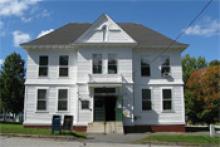Image


We know about a USDA program meant to bring broadband to rural America. Our information is that most of the money has gone to suburban communities in Texas, and we don’t have a professional grant administrator to chase down any money that might be left. We’re aware that the Massachusetts governor just signed a $40 million act establishing the Massachusetts Broadband Institute, to figure out how to bring broadband to unserved and underserved towns. We’re also aware that the money will go to vendors to develop regional systems and we don’t have the patience to wait the two or three years it will take for anyone to get around to thinking about maybe serving us.Ultimately, the City was able to lend itself the money:
As it has turned out, we didn’t need to borrow — town financial officers found the funds without going to the bank for them. We got the necessary permits from the owners of two towers here, bought the equipment, got a couple of people trained to install the equipment, and turned on our first customers in March, 2009.Between a local mountain and available cell tower, the topology apparently fits a fixed-wireless approach (at least for a significant part of the population). Nonetheless, they were well aware that the system would not have the reliability of robust wired networks - but occasional interference was vastly preferable to the status quo. The plan expected to break even with as few as 15 households, but they have since achieved far more than that -- some 70 households as of February 2010. Aside from an upfront receiver cost of $400-$500 (which can be shared among close neighbors), the costs are $50/month. They are running backhaul on two T-1 lines, for which they pay $600/month -- a reminder of just how much people in rural areas have to overpay for basic connectivity. They expect to break even in 2012. However, they may push that back depending on expansions decisions:
There are still families in town eager to subscribe, but we’re running out of places our wireless signal can reach. Expanding the system is possible, but there’s a lot to figure out. If we spend subscriber fees to buy the needed equipment, that delays the day when we’ve paid off our debt to the town, and we’re aware that not all taxpayers benefit equally from having lent us the $40,000.Not to harp on the whole failure of state and federal policy thing, but:
We may be able to obtain a state grant to buy what we need, but that means a ton of paperwork and all three members of the broadband committee (of which I’m one) are self-employed, and if we don’t work we don’t earn. That leaves the proposal writing to the town’s part-time administrative coordinator, and he’s as busy as a one-armed paperhanger with the hives. We’ll figure it out, but there’s another consideration.Too often, federal and state attempts to help just complicate the matter. The first thing a state should do to expand community broadband is to remove barriers to it, not set up complicated grants and such that are too complicated to help the smaller towns with even smaller staffs. Finally, the blog post that alerted me to all this also updated me on the Wired West Initiative:
Three of the 49 towns decided they had sufficient broadband Internet coverage not to bother. So far, 39 of the remaining 46 towns have voted to join WiredWest, all but one by unanimous vote. Six towns will have their ATMs [Annual Town Meetings] during the rest of the month, and in one the select board will vote (almost certainly favorably.)Photo of Warwick City Hall used under Creative Commons license, courtesy of John Phelan
